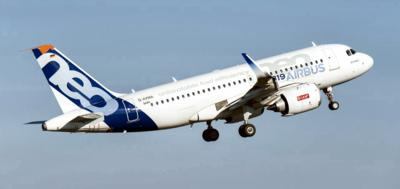Thu, Nov 04, 2021
Cooking Oil Turned Jet Fuel Coming to an Airbus Near You
The French Ministry of Transports and Safran have announced the first in-flight evaluation of a single-aisle aircraft running on 100% unblended sustainable aviation fuel (SAF). The Testbed for the project, a single CFM LEAP-1A engine equipped on an Airbus A319neo, functioned well during its test flight over Toulouse, France. Initial results from its other ground and flight tests are expected in 2022 as the system moves towards certification.

SAF development comes at an appropriate time, with the IATA setting a carbon reduction goal of 50% by 2050 amongst members, as well as a cap on CO2 emission increases from 2020 onwards. Sustainable AvFuel has been a target of the industry for some time, as synthesized products could not only lessen the environmental effects of fuel burn, but help certain economies dissociate from the unstable pricing of oil markets and move production onto their home turf. The SAF used in the test was the product of Total Energies, made from hydroprocessed esters and fatty acids gleaned from waste cooking oil and other fats. Produced near the testing regime in Normandy, France, the fuel will be used for compatibility and engine operability for study on Safran Helicopters’ Arrano engine. If those tests are successful, Airbus helicopters could be cleared for SAF use as well. Across the project, Total Energies has earmarked 57 tonnes of SAF for testing.
Airbus has taken charge of characterizing and evaluating the impact of the fuel’s usage on in-flight and ground emissions. Safran will perform LEAP engine ground tests later this year, as well as ensure successful adaptation for fuel delivery subsystems. Additional projects in a similar vein are taking place under VOLCAN, the title for the new carbon alternatives working group, integrating industry partners and financing from the France Relance recovery plan. Ultimately, the study seeks to promote large-scale deployment and use of SAF, and certification of 100% SAF for commercial passenger aircraft.
More News
Its Offerings Are Lighter, Cleaner, and Now Pushing Past 1,000nm on SAF Jet Fuel DeltaHawk’s diesel-powered aircraft lineup has seen incredible upgrades over the last few yea>[...]
The Airplane Experienced A Total Loss Of Engine Power On December 3, 2025, about 1600 central standard time, a Mooney Aircraft Corp. M20K, N57229, was substantially damaged when it>[...]
Make Sure You NEVER Miss A New Story From Aero-News Network Do you ever feel like you never see posts from a certain person or page on Facebook or Instagram? Here’s how you c>[...]
Aero Linx: European Society of Aerospace Medicine (ESAM) As a pan-European, independent forum, it works to promote the safety and health of all persons involved in aviation and spa>[...]
“We are excited to see Wisk achieve this milestone, and I’m so proud of the team that made it possible. The team at Wisk has built advanced technologies across flight c>[...]
 Aero-TV: DeltaHawks Diesel Power Steps Into the Spotlight
Aero-TV: DeltaHawks Diesel Power Steps Into the Spotlight NTSB Prelim: Mooney Aircraft Corp. M20K
NTSB Prelim: Mooney Aircraft Corp. M20K ANN FAQ: Turn On Post Notifications
ANN FAQ: Turn On Post Notifications ANN's Daily Aero-Linx (12.20.25)
ANN's Daily Aero-Linx (12.20.25) Aero-News: Quote of the Day (12.20.25)
Aero-News: Quote of the Day (12.20.25)



